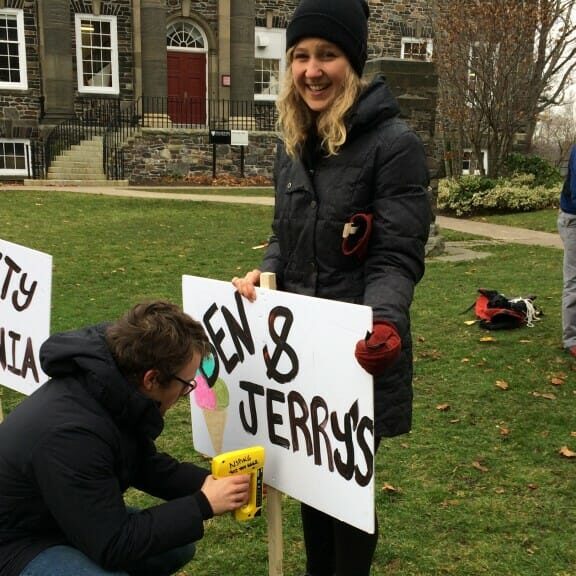
The administration is out of touch with what the people who teach, research, and study at this university support. Widespread affirmation of divestment is growing, and the administration needs to start listening.
Advocating for divestment (the withdrawal from Dalhousie’s endowment fund investments) of the top 200 largest coal and oil companies is a strategic way to erode the social license of companies whose business models depend on accelerating catastrophic climate change. One of Divest Dal’s three campaign goals – increased transparency of the investment portfolio – has already been increased, and arguably fossil fuel companies have less social license than ever before. Recently, we reached another milestone in our campaign when the Senate ad-hoc committee released an interim report on fossil fuel divestment, which recommends the development of an ethical investment policy that goes above and beyond our original asks. Fantastic! But what exactly does this mean and how did we get here?
From the early days of the campaign, we had the support of the Dalhousie Student Union (DSU), which unanimously agreed that public institutions have a moral responsibility not to profit from climate wreckage, and soon after voted to divest their own funds in 2013.
In order to begin the divestment conversation with the university administration, we went to the top, consulting with the Board of Governors Investment Committee and asking for a vote in November 2014. The Board (~26 members – responsible for most operational decisions at Dal) responded with a ‘no’ based on incomplete research and assumptions, only days after an endorsement of our campaign from the Dalhousie Faculty Association.
Dissatisfied with the research and results produced by the Board of Governors, Dalhousie’s Senate (~70 members – responsible for all academic matters at Dal) motioned to re-engage in the research process in order to inform a path forward on divestment from the academic (rather than administrative) point of view. With the support of students, faculty and the Senate, the Board of Governors would have to listen to the voices of the greater Dalhousie community and reconsider their exclusive November 2014 decision. Right?
The report that Senate has produced reflects exactly what the Board of Governors failed to see the first time. Namely that “[t]he world is a better place because of campus leadership” and that the role of a public research institution “is to be a voice for facts, truth, and justice” (Senate Report 31). This is a powerful endorsement of Dalhousie’s responsibility to practice what it preaches and align its investment strategy with its ethics and values.
The Senate report goes on to explore the idea of a ‘reverse onus’ approach to divestment, where Dalhousie would reach out to companies it intends to divest from in order to give them a grace period to demonstrate that their business practices align with Dal’s ethical investment policy. That policy would be based on four framework principles that state companies cannot: 1) lobby against climate policy, 2) oppose international emissions reductions efforts, 3) support climate change denial or 4) hold significant fossil fuels reserves, that if burned might lead to catastrophic climate change. This investment criteria encompasses all of our campaign demands and more.
But what now?
Dalhousie has had its chance to discuss divestment in the context of fossil fuels and the message is clear. The consensus position of the Senate committee on fossil fuel divestment recommends an ethical investment policy that starts with fossil fuel divestment. After all, divestment isn’t a new concept for Dal. The same widespread support from the DSU, DFA and the Senate led to divestment from apartheid South Africa in 1986. In 2014, the Board of Governors remarked that Apartheid was an “abhorrent injustice” and we agree whole-heartedly. The fact that those least responsible for climate change will be most negatively affected also classifies climate change as a great injustice and Archbishop Desmond Tutu has called climate change the human rights issue of our era. Thus, divestment from fossil fuels is also a matter of justice.
We demand that the Board of Governors and President Florizone take this as a cue to finally start listening to the wider Dalhousie community.
This is a call to action. No one at this university single-handedly caused the climate crisis or designed the investment portfolio to include fossil fuels. However, we all have a collective responsibility to reconcile these incompatibilities, and the climate will not wait. The best time to divest would have been three years ago, the second best time is now.






